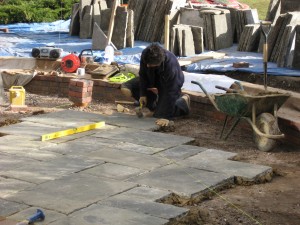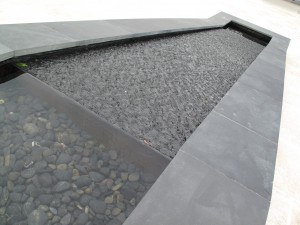When my daughter was about six, she said to me: “I know a bad word, Daddy”. Gingerly, I inquired further. “HAIRWASH” came the answer. I think if you asked many garden designers or landscape architects, their answer for a bad word would be “DESIGN-BUILD”.
So why, after twenty years business do we (at Bowles & Wyer) persist with this model? And is it all bad? Indeed, isn’t this where garden design started? – Capability Brown and Repton frequently worked on a design and build basis. A few myth busters first –
“D&B companies have an unfair advantage over garden designers because they can cut their fees.”
It is true that on smaller jobs, design and build can have the edge here. However, I see this as a positive for both the designer and the client. It allows us to bring professional design values to jobs that would otherwise slip entirely through the design net. On middle-sized and larger jobs, we tend to separate the design and construction costs. We never submit unrealistic or discounted fees to win the construction work. Designers who come up against us in the market place will back me on this. In fact we are rarely the cheapest – but that is because we are very good and don’t take any shortcuts.
“But surely D&B means poor quality – ducking and diving to save a penny here and there?”
Not so – although I would say that wouldn’t I? We don’t advertise, we trade by our reputation: our standing in the industry is very important to us. We have a name for fairness and integrity – talk to anyone about us and you will get the same response. In fact I would argue that D&B means that you can achieve much better quality. Basically, only if you can retain control of the whole process can you really control the quality. See my blog post How to create the perfect garden for more on this.
“But doesn’t that mean that because your contracts are negotiated you are more expensive?”
In the long run, no. And by the long run I only mean the length of the contract. If you select the cheapest contractor of those who are tendered competitively, it often turns out to be a false economy. With a negotiated D&B contract there is no-one to blame but the designer contractor, so there is a real incentive for us to keep the costs down.
“If all that is true, why is it that Bowles & Wyer also do design only and build only?”
Because every client and every job is different. We are focussed on best value for the client. In addition, not all clients use all parts of our services, but they all like the fact that we have a broad range and that one part informs another. So when we are designing we understand about those awkward issues like programme, cost and buildability. And when we are building for other designers (which we frequently do), because we come from a design background we understand about quality and detail.
I think that the real reason we get involved in construction is because we love it. We have a real enthusiasm for all aspects of the process. It is a philosophical point as well as a practical one. Humphrey Repton said that “No work can be so well completed as under the eye of the person who designs the improvement”. The design and construction process are inextricably linked . Just because we build things doesn’t mean that we are not design led – our reputation for innovative and imaginative design is why most of our clients come to us.
Of course, we don’t think that everyone should do what we do. We think that ours is the right approach for the specific market in which we work. It certainly isn’t right for every situation; but we do have a lot of fun.



